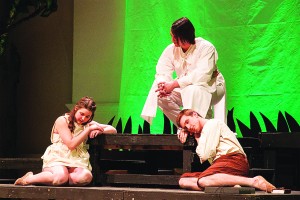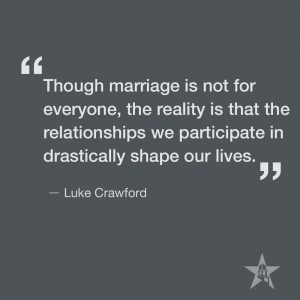Friday, April 11, marks the opening of the Lyric Theatre’s production of Children of Eden. Written by the critically acclaimed John Caird (Les Miserables) and composed by three-time Grammy and Academy award-winning Steven Schwartz (Godspell, The Prince of Egypt, and Wicked), Children of Eden is the book of Genesis retold through the format of a musical drama.
 When asked what makes this particular production compelling, Director Mitchell Hutchings enthused, “I am excited to work with these students because of their commitment to a well-crafted end product, many of these singers and actors have won prizes in their given discipline at very high levels.” Children of Eden remains popular with audience members worldwide, not only for the quality of the music, but also for the fun of seeing familiar biblical characters brought to life on stage. Senior and Student Director, Aaron Young, commented, “It’s really a story about God’s faithfulness. The big question through the whole show is will God follow through? It’s heavy stuff to think about how Adam and Eve must’ve felt, but there’s also a lot of fun.”
When asked what makes this particular production compelling, Director Mitchell Hutchings enthused, “I am excited to work with these students because of their commitment to a well-crafted end product, many of these singers and actors have won prizes in their given discipline at very high levels.” Children of Eden remains popular with audience members worldwide, not only for the quality of the music, but also for the fun of seeing familiar biblical characters brought to life on stage. Senior and Student Director, Aaron Young, commented, “It’s really a story about God’s faithfulness. The big question through the whole show is will God follow through? It’s heavy stuff to think about how Adam and Eve must’ve felt, but there’s also a lot of fun.”
In an interesting coincidence, the musical’s opening falls closely behind the release of Noah, a film that has sparked controversy due to its deviation from the Old Testament text. Children of Eden is also a creative interpretation, and certain artistic licenses are taken. However, unlike Noah, those involved are producing the show with reference to their own Christian worldview. The message conveyed is ultimately one of the fidelity of God, or “Father” as he is named in Act One. Sophomore, Tim McGowan, who plays the role of Adam, remarked, “It’s not biblical Genesis, it doesn’t claim to be either. I just came in with a really open mind.” Though Children of Eden strays from biblical accuracy, to focus on and rage about inconsistencies would be to miss the point.
Young observed, “Reading the script, a lot of the cast raised their eyebrows and were like ‘I don’t think that’s how God would do it.’ I think, if you stop and think about that phrase, that’s the adventure of the Christian life, figuring out who our God is. If we want to be empowered, gospel-bringing believers, we need to stop and understand other people’s worldviews.” The musical humanizes the characters in Genesis providing insight into their probable motivations, hopes, and fears which are not wholly present in the biblical text. The writers explored and read between the lines.
Children of Eden is director Mitchell Hutchings’s first musical production at Houghton College. When asked why he chose this particular show he said,“I saw Children of Eden while I was still a student at Western Carolina University, and I completely fell in love with it. I liked its theme, and I liked that it was willing to talk about some tough issues.”
When asked about the impact the musical has made on his life so far, Young enthused, “I can say this is one of the best musical experiences I’ve ever had. Working with the cast, with the chorus, I’m shocked at how well they’re getting along. I have sort of a ‘proud parent’ moment every rehearsal. Our faith unifies us, our love for music, our energy, so yeah, I would say we are a family.”
Children of Eden is a production that breathes new life into the Old Testament text, humanizing the characters of Genesis and providing insight into stories we’ve been told since Sunday School. It will be performed in Wesley Chapel, Friday and Saturday, April 11 and 12. Tickets are available for purchase in the Campus Center.

